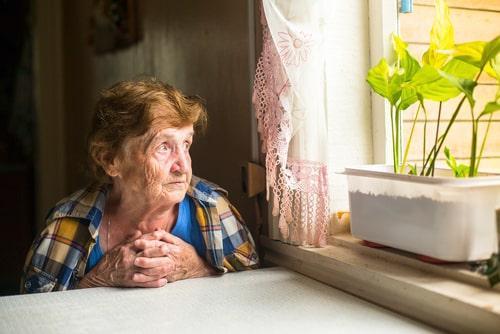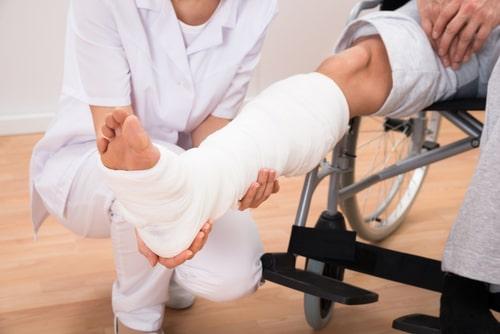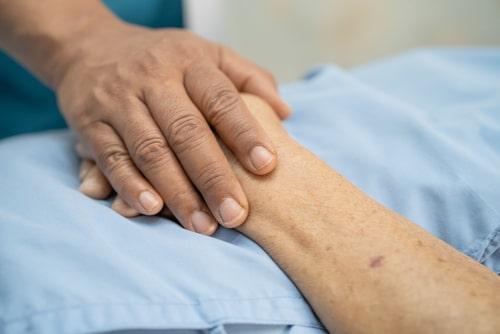Recent Blog Posts
Suing After a Life-Threatening Injury at their Nursing Home
 Older adults are amongst the most vulnerable of our society's population. In many instances, a person of advanced age may be unable to care for themselves properly. In some cases, they may need lots of assistance or just a little help here or there. At the very least, when you place your loved one in a nursing home facility, you expect their needs to be acknowledged and met by the healthcare professionals working there.
Older adults are amongst the most vulnerable of our society's population. In many instances, a person of advanced age may be unable to care for themselves properly. In some cases, they may need lots of assistance or just a little help here or there. At the very least, when you place your loved one in a nursing home facility, you expect their needs to be acknowledged and met by the healthcare professionals working there.
Any family's worst nightmare is for their loved one to suffer a life-threatening injury while living in a nursing home facility. Unfortunately, when an injury of this type occurs,it sometimes results from some form of nursing home abuse and neglect. If your loved one has suffered a life-threatening injury while at a nursing home, consider contacting an attorney with experience working in cases where elder abuse may occur.
How To Proceed with a Wrongful Death Claim Caused by Nursing Home Neglect or Abuse
 As their loved ones grow older and lose the ability to take care of themselves, a family may decide the best course of action is to move their loved one into a nursing home facility. When families make difficult decisions such as this, they expect, at the very least, that the facility they are moved into is a safe and caring environment that will adequately take care of the family member they love dearly.
As their loved ones grow older and lose the ability to take care of themselves, a family may decide the best course of action is to move their loved one into a nursing home facility. When families make difficult decisions such as this, they expect, at the very least, that the facility they are moved into is a safe and caring environment that will adequately take care of the family member they love dearly.
Substandard care in a nursing home facility is any family member's worst nightmare. Further unconscionable is the prospect of a family member dying because of the care they did or did not receive. If you believe your loved one suffered a wrongful death in a nursing home facility, consider contacting a lawyer with experience in nursing home abuse and neglect to understand your rights and the options you have moving forward.
What Constitutes a Wrongful Death in a Nursing Home?
Does Nursing Home Understaffing Increase the Risk of Abuse?
 Studies show that a tragic number of vulnerable adults are abused or neglected in nursing homes across the country, and that the longer someone stays in a nursing home, the likelier they are to face abuse or neglect. When stories of nursing home abuse make headlines regularly, those with loved ones in residential care facilities may be wondering how such a thing can continue to happen.
Studies show that a tragic number of vulnerable adults are abused or neglected in nursing homes across the country, and that the longer someone stays in a nursing home, the likelier they are to face abuse or neglect. When stories of nursing home abuse make headlines regularly, those with loved ones in residential care facilities may be wondering how such a thing can continue to happen.
Unfortunately, the answer lies in a problem that currently plagues a large portion of the U.S. economy and hits caregiving occupations particularly hard: difficulty recruiting and retaining quality staff. When nursing homes have a hard time hiring enough staff to properly care for their residents, they often resort to hiring subpar candidates, overlooking criminal backgrounds, questionable work histories, or a lack of appropriate qualifications. Sadly - although perhaps, predictably - inadequate staffing results in higher rates of abuse and neglect.
How Can Improper Monitoring Lead to Bone Fractures in Nursing Homes?
 Elderly and sickly residents of Illinois nursing homes are at an increased risk of many different illnesses and injuries. Because of an elderly body’s compromised immune system and slower healing times, injuries that would heal quickly for a younger person can cause serious damage and even lead to unexpected fatalities in nursing home residents.
Elderly and sickly residents of Illinois nursing homes are at an increased risk of many different illnesses and injuries. Because of an elderly body’s compromised immune system and slower healing times, injuries that would heal quickly for a younger person can cause serious damage and even lead to unexpected fatalities in nursing home residents.
Some of these seemingly mild injuries that can become very serious are bone fractures. Because bone fractures are usually not as serious as outright breaks, they tend to get overlooked as a contributing factor to serious pain, loss of life quality, and increased risk of death. But it is important to take bone fractures in elderly nursing home residents seriously and to be aware of avoidable causes like nursing home neglect.
Fractured Bones Can Be Caused When Unsupervised Residents Fall
Gastroenteritis in Nursing Home Patients Can Lead to Hospitalization and Death
 Nursing home residents are often elderly and physically frail, causing them to easily fall victim to diseases and illnesses which are non-threatening in otherwise healthy populations. Illinois nursing homes must meet a high standard of care to make sure that elderly residents are not subjected to conditions that could cause serious illness or death, and–if dangerous conditions are present in a nursing home–that residents are immediately treated. If your loved one has suffered or died from gastroenteritis or another serious infection, contact an Illinois nursing home neglect attorney right away.
Nursing home residents are often elderly and physically frail, causing them to easily fall victim to diseases and illnesses which are non-threatening in otherwise healthy populations. Illinois nursing homes must meet a high standard of care to make sure that elderly residents are not subjected to conditions that could cause serious illness or death, and–if dangerous conditions are present in a nursing home–that residents are immediately treated. If your loved one has suffered or died from gastroenteritis or another serious infection, contact an Illinois nursing home neglect attorney right away.
What is Gastroenteritis?
Gastroenteritis is a serious condition caused by viral and bacterial infections that irritate the stomach and intestines and cause them to become inflamed. Nursing home residents are four times more likely to die from gastroenteritis and are generally infected after being exposed to another infected person or contaminated food or water. Symptoms of gastroenteritis include:
How Could My Loved One Have Suffered a Life-Threatening Injury in a Nursing Home?
 When you made the decision to place your loved one in the care of an Illinois nursing home, you likely had no idea that the facility would do anything other than conform to the highest standard of care. Unfortunately, many nursing homes suffer from chronic issues of understaffing and poor training that can have a severe impact on the quality of the care that residents receive.
When you made the decision to place your loved one in the care of an Illinois nursing home, you likely had no idea that the facility would do anything other than conform to the highest standard of care. Unfortunately, many nursing homes suffer from chronic issues of understaffing and poor training that can have a severe impact on the quality of the care that residents receive.
One of the most traumatic things that can happen to a family is receiving a call informing them that their parent, grandparent, or other loved one has been seriously injured in an accident in a nursing home. While some of these accidents are the inevitable result of aging bodies that struggle with mobility, others are the result of inadequate supervision, a dangerous environment, and even sometimes a result of abuse and neglect at the hands of nursing home staff. If you have gotten news that your loved one has been seriously injured at a nursing home, it is important to get details about the incident as soon as possible. An experienced Illinois nursing home injury attorney can help.
Unsanitary Conditions in Nursing Homes Can Cause Illness and Death
 Placing a loved one in the care of a nursing home or residential care facility can be one of the toughest choices a family makes. Trusting in management and staff to give your loved one the care they need and deserve can feel like a risky gambit, especially when stories of understaffed nursing homes are so common. The last thing you want to worry about is whether the basic conditions at your loved one’s nursing home are sanitary and safe. Yet when a nursing home is struggling to meet staffing requirements, proper sanitation is often one of the first signs that your loved one is being neglected and needs to be given urgent attention. If you are worried about the cleanliness of your parent or grandparent’s nursing home, trust your instincts and find out whether it is time to take action.
Placing a loved one in the care of a nursing home or residential care facility can be one of the toughest choices a family makes. Trusting in management and staff to give your loved one the care they need and deserve can feel like a risky gambit, especially when stories of understaffed nursing homes are so common. The last thing you want to worry about is whether the basic conditions at your loved one’s nursing home are sanitary and safe. Yet when a nursing home is struggling to meet staffing requirements, proper sanitation is often one of the first signs that your loved one is being neglected and needs to be given urgent attention. If you are worried about the cleanliness of your parent or grandparent’s nursing home, trust your instincts and find out whether it is time to take action.
Unsanitary External Conditions May Be a Sign of More Serious Dangers
When you visit your loved one in their nursing home and notice things just do not seem to be clean, take note. Nursing home residents are often elderly and immunocompromised, which can mean that exposure to bacteria, viruses, and other diseases can quickly become dangerous. If common areas like kitchens and bathrooms seem dirty, residents’ equipment may be unclean as well. Medical equipment, such as wheelchairs, oxygen tanks, and catheters, requires regular cleaning and sanitizing. Without careful sanitization, residents can fall victim to:
Serious Health Conditions Can Result From Poor Dental Hygiene in Nursing Homes
 Illinois nursing homes are responsible for providing their patients with everyday care and support. From feeding and cleaning to comfortable rest and intellectual enrichment, patients are often completely dependent on the staff in residential care facilities to meet their needs. Sadly, nursing homes are often not as diligent about providing excellent staff as they should be, leading to neglect and even abuse.
Illinois nursing homes are responsible for providing their patients with everyday care and support. From feeding and cleaning to comfortable rest and intellectual enrichment, patients are often completely dependent on the staff in residential care facilities to meet their needs. Sadly, nursing homes are often not as diligent about providing excellent staff as they should be, leading to neglect and even abuse.
One of the first places nursing home neglect often appears is in residents’ dental care. Regular dental care requires daily attention to minute details. Symptoms of derelict dental care appear quickly, making it hard to fake quality dental care where there is none. Problems that start in the mouth rarely stay there; dental problems often snowball into further, more serious issues. Elderly people are at particular risk of contracting illness and disease through poor dental care. Here are some common oral health problems in nursing home residents without proper dental care.
Five Conditions That Can Cause Sepsis in Illinois Nursing Home Residents
 When a body becomes overwhelmed with an infection, it may kick the immune system into overdrive. Sometimes, this triggers a dangerous condition called “sepsis.” Sepsis is not an infection per se, but rather a full-body immune system response in which the body begins attacking its own tissues. This can rapidly lead to organ failure and death.
When a body becomes overwhelmed with an infection, it may kick the immune system into overdrive. Sometimes, this triggers a dangerous condition called “sepsis.” Sepsis is not an infection per se, but rather a full-body immune system response in which the body begins attacking its own tissues. This can rapidly lead to organ failure and death.
Because of their vulnerable health and difficulty communicating, elderly residents of nursing homes are at increased risk of suffering from sepsis. Here are five conditions that can cause sepsis in an Illinois nursing home if proper treatment, supervision, or cleanliness is not observed.
Bed Sores
When a patient lays in bed for too long, the pressure of their body weight on the contact points with the bed or chair can turn into bed sores. Nursing home staff are responsible for moving patients regularly and ensuring they do not develop these painful sores. If the sores do begin to develop, nursing home staff should catch them well before they become an open wound susceptible to infection.
Dehydration Can Be Deadly to Nursing Home Residents
 Everyone knows that the human body requires water. However, few realize just how quickly dehydration can occur. When a person’s body is already weakened due to age or illness, appropriate hydration is essential. Consequently, nursing home residents are at an especially high risk of dehydration-related consequences. Staff must be extra vigilant for signs of dehydration. If a resident is dehydrated, action must be taken immediately to prevent serious medical complications or death.
Everyone knows that the human body requires water. However, few realize just how quickly dehydration can occur. When a person’s body is already weakened due to age or illness, appropriate hydration is essential. Consequently, nursing home residents are at an especially high risk of dehydration-related consequences. Staff must be extra vigilant for signs of dehydration. If a resident is dehydrated, action must be taken immediately to prevent serious medical complications or death.
Symptoms of Dehydration in Nursing Homes
Dehydration occurs when the body loses more fluid than it consumes. Elderly individuals already have lower levels of hydration and many take medications that further lower the volume of water in their bodies. Nursing homes must carefully monitor the amount of water residents consume and look out for signs of dehydration such as:
-
Infrequent urination
-
Dark-colored urine

 312-535-4625
312-535-4625





